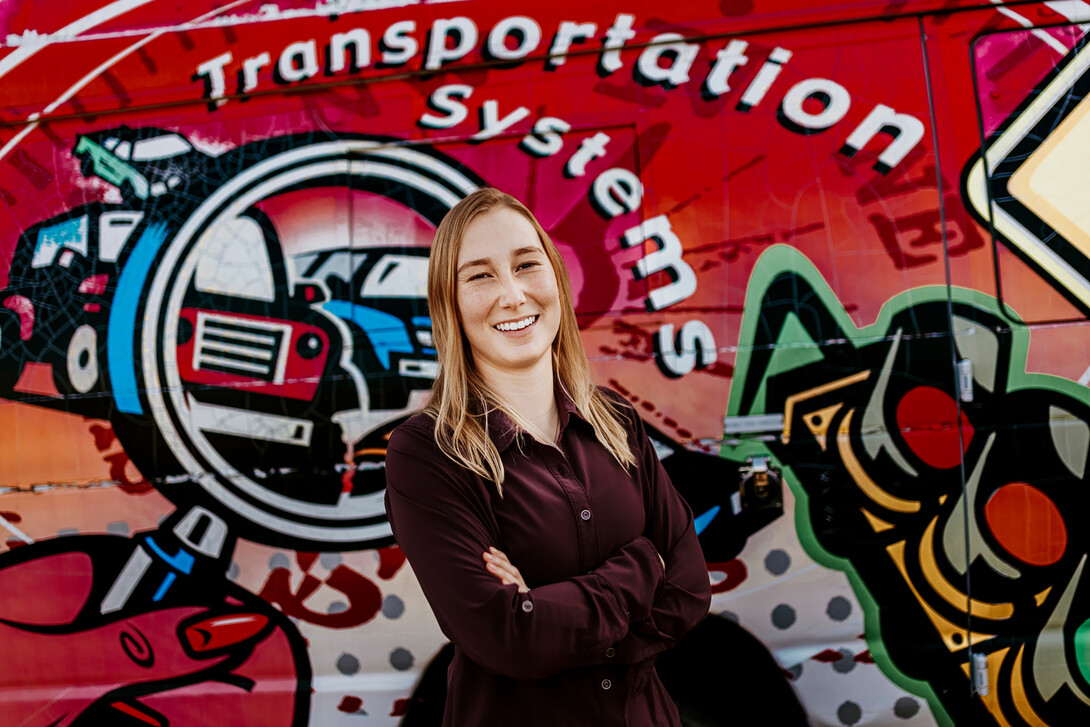
Editor’s Note — This is part of a weekly student conversation series highlighted as part of Native American Heritage Month on the University of Nebraska–Lincoln’s Medium page. The series will feature students who are making impacts on campus and beyond. This week, meet Sydney Allen, a member of the Oglala Sioux Tribe from Rapid City, South Dakota, who recently graduated with her master’s degree in civil engineering. On and off campus, she’s making a difference in Native American communities.
Talk a little bit about your personal and professional background.
I was a master’s student in Civil Engineering and my research was focused on transportation safety in rural areas and areas that are home to Native American Reservations. I am from Rapid City, South Dakota, and I am an enrolled member of the Oglala Sioux Tribe. I started my undergraduate degree in Civil Engineering at the South Dakota School of Mines and Technology. Although I enjoyed my time at Mines, I transferred to UNL in 2017, and finished my undergraduate degree in 2019.
What did you do in your time at the College of Engineering — and what did you enjoy about it?
I was a graduate research assistant through the Mid-America Transportation Center, and I was funded by a National Science Foundation National Research Traineeship. My thesis research was on safety associated with the transportation of hazardous material through rural areas, and areas that are home to Native American Reservations. Although Native Americans make up less than 2% of the population, on average two Native people are killed every day in motor vehicle crashes. For this reason, more resources and attention needs to be dedicated to addressing transportation safety on Native American Reservations. I feel incredibly lucky to be a part of the College of Engineering where I am able to research issues that are important to me, and hopefully make a difference in Native American communities.
How do you bring your own unique background to your role in the college or your professional life?
I was really fortunate to have found the Mid-America Transportation Center (MATC) after transferring to UNL as an undergraduate student back in 2017. Through MATC, I have mentored Native American students from the Winnebago Reservation and the Omaha Reservation in Nebraska through the Roads, Rails, and Racecars engineering after-school program. In addition to Roads, Rails, and Racecars, I have been a mentor for the annual Sovereign Native Youth STEM Leadership Academy. This is a great program where Native American high school kids from all over Nebraska spend a week in Lincoln learning about the many different careers in STEM.
I think this kind of mentoring is really important because we put an emphasis on showing kids that there are so many different paths in STEM, and they can choose any of them! By showing the kids how someone who looks like them, or grew up like them, has been successful in a STEM career, the concept starts to resonate with them, and they realize that they can do it too. Another program I have been able to be a part of is the Scholar’s Program. The Scholar’s Program focuses on encouraging students attending two-year programs at Tribal Colleges to go on to pursue a four-year degree. Through the Scholar’s Program, I have been able to share my experiences as a Native American college student, talk about why I decided to get an engineering degree, and give insights into what got me through my moments of self-doubt — because every student has had or will have those moments.

What do you hope to accomplish in your lifetime?
One goal I set — when I decided to get my master’s degree — was to someday teach at a tribal college. Specifically, I want to teach math and/or physics. Tribal colleges are generally two-year programs and are absolutely essential in preparing students for a four-year program. People sometimes shy away from pursuing STEM degrees because they don’t think that they are naturally good at math or physics, but I think that is a myth. Anyone who has a passion for it, and is willing to put in the effort, can succeed. That is why I want to teach at a tribal college — to give students a strong base in those subjects and raise their confidence levels. That way they are better prepared to successfully complete a STEM degree. Native people bring a unique perspective and we need more of us in a position to share that perspective and be heard.
Who inspires you?
My mom. She had my sister at the age of 20, and completed her bachelor’s degree in accounting as a single mom with a young child. Eleven years later, she went back to school to get a master’s degree in accounting and ended up doing her oral exams early, in February, because I was born in April. She has instilled the importance of education in my sister and me. She is an absolute superstar! When I was in school, if I ever felt overwhelmed, I would always think about my mom grinding to support herself and my sister while going to school full time. If she could do that — I can get through this.
What is your advice to students looking to make an impact?
Get involved with people who have goals that inspire you, and start building your network of contacts. I have been extremely fortunate to work with the Mid-America Transportation Center and, as a result, I have been able to develop a network of incredible people who are always trying to make an impact in Native American communities. Occasionally, I am able to be a part of those programs or projects. The first step is to just get involved. One of my favorite quotes is by Hillel, a first-century Jewish scholar, who said, “If not you, then who? If not now, when?”







